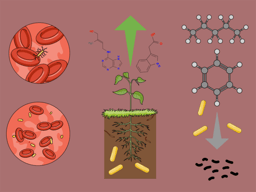The npj Digital Medicine Editorial Fellowship: From “Behind the Scenes” to the Forefront of Digital Health Innovation
Published in Healthcare & Nursing

I had a few years of internal and respiratory medicine residency training in Germany behind me when I started a master’s degree in biomedical informatics with an emphasis in clinical informatics at Harvard Medical School in the fall of 2021. I aimed to expand my knowledge about informatics and digital applications in healthcare settings, as I consider the participation of physicians in the (just beginning) digital transformation in healthcare pivotal. I want to shape the digital transformation in (internal) medicine and make an impact in the field in my role as a physician, researcher, and digital health enthusiast.
Albeit equipped with an MD, some years of residency training, a master’s degree, and having published a few papers, I was seeking how I could improve my skills in manuscript writing and critical thinking in terms of coming up with and executing new project ideas. And even more importantly, the field of digital health is so rapidly evolving that I was wondering how I could stay at the forefront of this field, build upon it, and contribute meaningfully to research.
Then, in Spring 2022, I learned that the newly created editorial Fellowship at npj Digital Medicine is calling for applications. At that time, the journal had already stood out to me. I regularly read its innovative and high-profile articles as they very often tackled my fields of interest. Now, as the journal was calling for a new fellow, I did not think twice and applied: The opportunity to get a “look behind the scenes”, being able to work together with the Journal’s leadership team, and getting the chance to improve my “researcher” skillset, was stunning.
The npj Digital Medicine Editorial Fellowship was created in 2021, and its goal is to provide clinical and academic trainees with unique opportunities to contribute to the peer-review process and operations of a high-impact journal in an exciting and rapidly evolving field. It was created by Joseph Kvedar (Editor-in-Chief), Wanda Layman (Executive Editor of Nature Portfolio) and Tillie Cryer (Senior Managing Editor of Nature Portfolio), and Jayson Marwaha. The first editorial fellowship ran from academic year (AY) 2021-2022 and was completed by Jayson Marwaha, MD, a general surgery resident physician and biomedical informatics postdoctoral fellow at Harvard Medical School.
Application process: Applicants were asked to hand in a CV along with a cover letter stating their motivation to participate in the editorial fellowship. The editorial team invited some applicants to a video-based interview, where I learned more about the fellowship and had the opportunity to meet the team and ask questions. A couple of days following the interview, I was invited to review a manuscript, the final step of the application process. A few days after I handed in my very first peer review, I received an email … and became the second fellow.
My Fellowship: In the fall of 2022, I started the editorial fellowship, which is structured in three phases. Each phase spans four months, with monthly one-on-one meetings with Dr. Kvedar:
Review phase: The first four months of the position involved peer reviewing 2-3 manuscripts per month under the guidance and supervision of the journal’s editorial board members. The goal of this phase was to learn to write high-quality, thoughtful, and constructive reviews on a wide range of informatics and digital health-related topics.
Editorial phase: The second four months of the fellowship involved highlighting recently published important work in the journal. With the help of the editorial board, in this phase, we identified impactful, high-quality work published in the journal and wrote editorials that made the findings of these studies and their real-world utility accessible to a wider audience beyond the traditional readership of the journal.
Operations phase: The final phase of the fellowship involved contributing to the journal’s operations. During this phase, I identified a few projects that would have a meaningful impact on the quality and efficiency of the journal’s operations. My focus for this final phase was developing a strategy to educate researchers more about the advantages of being a reviewer.
Now, as the end of my fellowship is approaching, I start looking back to this incredible year full of learning, inspiration, and growth
- New insights - Looking behind the scenes: Alike my predecessor Jayson, I had no clue what happened following the manuscript submission before I began the fellowship. The look behind the scenes demystified how the journal evaluates manuscripts, prioritizes topics, identifies reviewers, communicates with authors, and – importantly – how they amplify their articles. All of that helped me to improve my writing and communication skills. Beyond that, I also did not anticipate the enormous visionary work it takes to continuously improve the manuscript.
- It’s a give-and-take – peer review: The peer review process is the gold standard in our science community, and our science community would not be what it is without high-quality peer reviews. Being reviewed and being a reviewer both belong to a scientific career. I consider it an enormous privilege to learn how to be a good reviewer.
- At the forefront of Digital Health: Digital Health is a rapidly evolving field. While I reviewed manuscripts and wrote editorials, I not only sharpened my analytical and writing skills, but I also studied high-quality innovative studies that helped me to understand what is already possible in the field of Digital Health. But even more importantly, I developed new ideas for my research and clinical work that I can build on. Browsing through the new articles in the journal got a routine and will help me beyond the fellowship to stay at the pulse of time.
- Leadership: The npj Digital Medicine Editorial Fellowship was an incredible opportunity to learn from a highly professional team. Their passion and professionalism inspired me. I would like to thank Joseph Kvedar, Tillie Cryer, and the whole editorial team for their teaching, passion, visionary ideas, and continuous motivation for innovation.
I encourage you to reach out to the journal if you are interested in applying for the position (https://www.nature.com/npjdigitalmed/editorial-fellowship) or to me directly if you have any questions about the fellowship. Currently, the journal is looking for the next fellow (https://www.nature.com/npjdigitalmed/vacancies).
Follow the Topic
-
npj Digital Medicine

An online open-access journal dedicated to publishing research in all aspects of digital medicine, including the clinical application and implementation of digital and mobile technologies, virtual healthcare, and novel applications of artificial intelligence and informatics.
Related Collections
With Collections, you can get published faster and increase your visibility.
Evaluating the Real-World Clinical Performance of AI
Publishing Model: Open Access
Deadline: Jun 03, 2026
Impact of Agentic AI on Care Delivery
Publishing Model: Open Access
Deadline: Jul 12, 2026


Please sign in or register for FREE
If you are a registered user on Research Communities by Springer Nature, please sign in